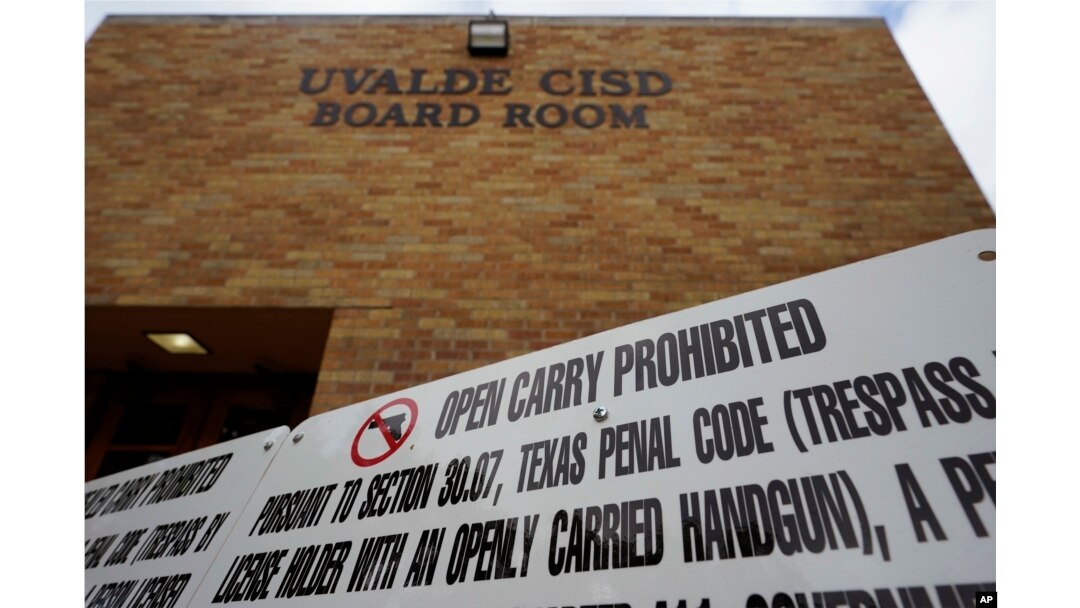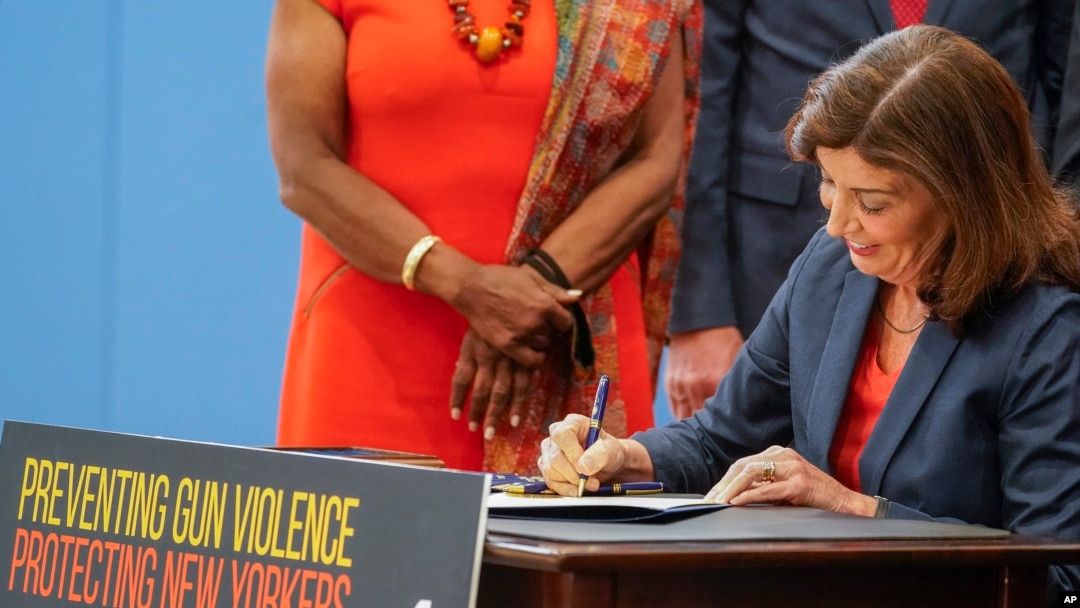A series of mass shootings across multiple U.S. states has shaken the nation and reignited debate about how to prevent gun violence in America. As some U.S. lawmakers seek to end nearly three decades of congressional inaction on gun legislation, state governments are taking differing approaches to address mass violence.
In New York this week, Democratic Governor Kathy Hochul signed into law legislation that raises the minimum age to purchase semiautomatic rifles from 18 to 21, restricts the sale of body armor and strengthens the state’s so-called “red-flag law” to heighten reporting requirements for mental health workers and law enforcement officers who receive credible information that a person poses a danger to public safety.
State lawmakers approved the measures days after an 18-year-old wielding an assault-style rifle opened fire inside a Buffalo, New York, supermarket, killing 10 people. Ten days later, an 18-year-old shot and killed 19 students and two faculty members at an elementary school in Uvalde, Texas.
“Mass shootings just keep happening over and over again,” Hochul said during the bill-signing ceremony. “I have to ask, when did we become a nation that reveres the right to have the ability to possess a gun over the right of a child to stay alive? When did that happen?”
New York’s push for tighter gun restrictions come as the U.S. Supreme Court is set to rule this month on a 100-year-old New York law that strictly limits a person’s ability to carry handguns. Some gun control advocates believe if the high court strikes down the law, it could invalidate similar statutes in Maryland, California, Connecticut and Massachusetts.

Signs prohibiting guns are displayed outside the Uvalde Consolidated Independent School District boardroom where District Superintendent Dr. Hal Harrell provided an update following the recent shooting at Robb Elementary, June 9, 2022, in Uvalde, Texas.
Differing approaches
While some Democrat-led states look to enact or strengthen gun control laws, several Republican-led states are contemplating other ways to prevent mass shootings, which number more than 250 in America so far this year, according to GunViolenceArchive.org, a Washington-based group that tracks gun violence.
Ohio’s legislature last week passed legislation allowing school boards in the state to authorize teachers to carry firearms in the classroom. State lawmakers also appropriated funds to boost security measures at school buildings and university campuses.
In Texas, Republican lawmakers and officials have proposed measures ranging from boosting the number of armed school police officers to restricting entryways to places of learning.
“We have to harden these targets to prevent would-be shooters from getting into schools ever, except maybe through one entrance,” said the state’s lieutenant governor, Dan Patrick, speaking recently on Fox News. “Maybe that would help. Maybe that would stop someone.”
In Washington, meanwhile, it remains to be seen whether Democrats and Republicans can unite behind any measures to contain gun violence. The Democrat-led House of Representatives on Wednesday passed a bill raising the age to purchase semiautomatic rifles and banning the sale of ammunition magazines that can hold more than 15 rounds, among other provisions. Senate passage of the bill is viewed as highly unlikely.
Familiar arguments on Capitol Hill
A bipartisan group of senators is trying to hammer out a set of gun violence prevention measures that can pass the evenly divided chamber. While negotiations continue, familiar arguments are being made on Capitol Hill for and against gun control.
“Only in America can a troubled teenager, showing all sorts of warning signs, get his hands on high-powered semiautomatic rifles and over 1,000 rounds of ammunition,” Democratic Senator Chris Murphy of Connecticut tweeted after the Uvalde shootings. “NO OTHER NATION ALLOWS THIS TO HAPPEN.”
The debate “immediately becomes about Democrats wanting to take away guns,” House Minority Whip Steve Scalise, a Louisiana Republican, said on Fox News Sunday. “Let’s go search for the root of the problem. How can we do a better job of connecting the dots and stopping something before it happens, like we did after September 11, which has worked well as it relates to stopping terrorist attacks?”
Polls show overwhelming public support for certain gun control measures, like making background checks of gun purchasers universal, and majority backing for banning the sale of the deadliest weapons.
“If people can easily have access to guns, the number of mass shootings will only increase,” Washington resident Joe Williams told VOA. Williams works with young people in high-crime neighborhoods in the nation’s capital to deescalate conflicts that could result in gun violence.
“We need laws that will keep guns out of the hands of young people,” Williams added. “We cannot stand by and watch people die and lives shattered without doing anything meaningful.”
States taking the lead
Action at the state level is not new.
Last year Democrat-led Colorado repealed a so-called preemption law. The law had prevented local governments from enacting stricter gun regulations than what state law allows. In recent weeks, several municipalities have put in place restrictive gun ordinances such as banning assault-style weapons, raising the minimum age for gun purchases and prohibiting carrying firearms openly in public places.
Laws changed in several states after the 2018 mass shooting at a high school in Parkland, Florida, where a 19-year-old former student killed 17 people. Republican-led Florida was one of several states to pass red-flag laws after the tragedy.
Florida also raised the minimum age to purchase long guns from 18 to 21 years old. Additionally, the state mandated a three-day waiting period to purchase guns and created a program to allow trained school staff to carry guns.
Now, as pressure mounts on lawmakers of both political parties to address rising gun violence at the federal level, the families of mass shooting victims are speaking out.
“It’s not about Republicans, it’s not about Democrats,” said Kimberly Salter, the widow of Buffalo mass shooting victim Aaron Salter, speaking at a news conference on Capitol Hill earlier this week. “It’s about people, it’s about human life.”


